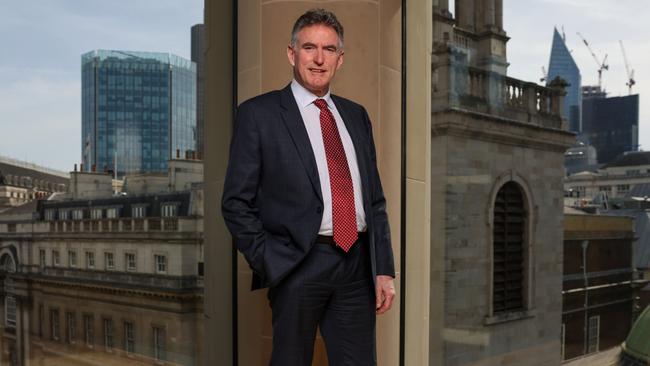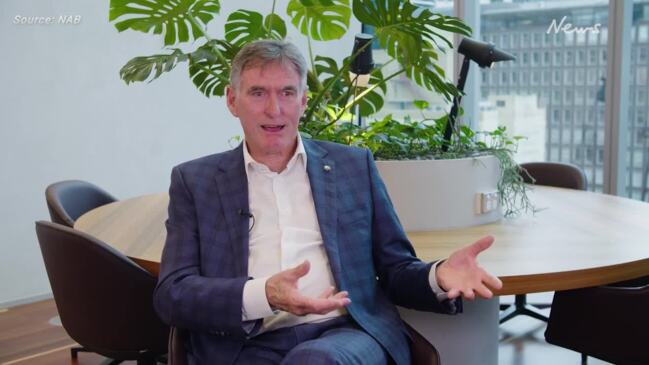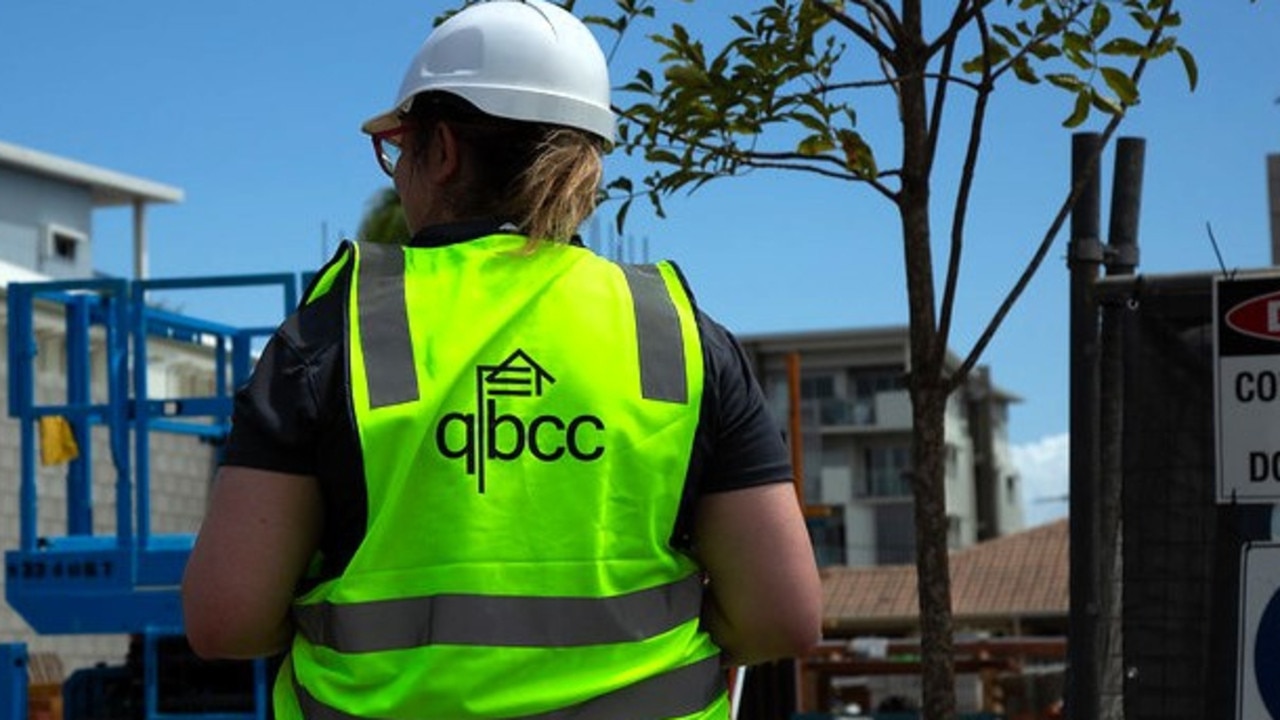‘I lost $13bn’: How NAB’s boss Ross McEwan reset banking
After four decades running banks across the world, there’s one thing that stands out for Ross McEwan.

Business
Don't miss out on the headlines from Business. Followed categories will be added to My News.
After four decades running banks across the world, there’s one thing that stands out for Ross McEwan. Keeping banking simple.
The National Australia Bank chief executive retires at the end of this week, calling time on his second stint as chief executive, and in both cases it involved a rescue mission.
Banks are fine when everything is running smoothly, says McEwan, but it becomes an entirely different story when they’re not making money.
McEwan’s biggest professional challenge was his six years in charge of the UK’s troubled Royal Bank of Scotland, a UK lender that collapsed in the global financial crisis after expanding too fast around the world, including through the disastrous buyout of Dutch lender ABN Amro.
RBS spent years on life support after being bailed out by taxpayers and when McEwan — a former Commonwealth Bank executive — took charge in late 2013, RBS was into its fifth year of debilitating losses.
“People say look how bad banks are when they make money. I can tell you it’s a lot worse when a bank is not making any money. I think my first loss pre-tax was about £7bn ($13bn),” McEwan says.
“It feels pretty terrible”.
McEwan made the comments in a video interview released to staff on Monday as he prepares to bow out.
Through his time at NAB and also at RBS, McEwan’s playbook has been to break banking down to its most simple. Banks need to look after their customers and make money for shareholders.
The keep it simple approach might sound hokey in a modern and highly-digitised context, but McEwan had seen the financial damage caused by his industry through the GFC as well as the aftermath where banks had lost touch with customers.
At RBS he set about on an aggressive restructuring plan that involved pulling RBS out of dozens of countries, including investment banking in Australia. RBS was also saddled with an unsustainable cost base in its home market, and McEwan had to oversee the closure of hundreds of branches, many in small villages across the UK.
The plan was built around turning RBS from a global business to being “a UK-European bank that had good capital levels that served customers well”.
“We had to get rid of a lot of cost unfortunately related to an old enterprise that related back to when Royal Bank of Scotland was in 52 I think or 54 countries around the world and bring it back to its core franchises that it was very good at in the UK.”

New assignment
Taking charge of National Australia Bank in December 2019 – just months before the Covid pandemic hit — was an entirely different assignment. Here was about rebuilding trust in a bank that had lost its way.
The big four lender was reeling from the stinging criticism of the Hayne royal commission, its board had been cleaned out and several top executives including former boss Andrew Thorburn had quit. The bank too had badly put customers and investors offside. The year before McEwan took charge, NAB copped a massive 88.1 per cent shareholder “strike” against its remuneration report. This is a record that stands today – Qantas last year came close with an 83 per cent strike after millions in bonus payments were made to former chief executive Alan Joyce.
But for all of its deep-seated problems, the NAB machine was still running relatively well. The bank was lending to customers, it was making money and paying out dividends.
So for McEwan, the challenge was less tangible. But it was one built around lifting engagement across 38,000 staff. This was around instilling the basic purpose of the bank, which is to help customers with their financial needs. This was so staff “could actually get excited about the business we had”.
McEwan says it is important to keep the momentum going forward of the royal commission. And that involves staying relevant to customers.
On the return from the Easter break on Tuesday, NAB’s head of business banking Andrew Irvine steps up as chief executive. While the 66-year-old McEwan leaves the building this week, there will be a transition period before formally retiring at the end of June.
Irvine currently runs NAB’s most important franchise of small and mid-sized business banking. For long time bank watchers, the succession represented a logical move as it keeps NAB largely on the same path, with Irvine planning to adopt McEwan’s “keep it simple” strategy. On being named as the successor last month, Irvine said: “There are not many big moonshots” in banking. “It’s about doing the basics really well.”
It might be simple on the outside, but McEwan has demanded high standards and discipline from his top executives. He is known for scheduling budget meetings on Friday afternoons. His investment spend runs below rival banks, but McEwan puts this down to less wastage and more focus.

Back to the core
The proof is on the market, with NAB’s shares up more than 33 per cent under McEwan and 25 per cent in the past year. NAB is pushing its highest market capitalisation on record as it nears $110bn, making it the nation’s second-biggest lender. Even so, there is some distance with CBA, which is pushing $200bn.
The real test will be whether, in coming years, McEwan and Irvine have been able to snap NAB’s reputation for being accident-prone. From botched US investments, foreign currency scandals, Irish bank robberies, to be caught out holding risking assets during the global financial crisis, much of NAB’s legacy issues have been from the lack of management attention. The relative calm and stability under McEwan has given NAB the room to focus on its core business and retail banking operations and trying to do fewer things at once. This has seen NAB’s market value pull away sharply from rivals ANZ and Westpac, while improving its returns against market leader Commonwealth Bank.
When McEwan was named in the role, the understanding was he was not going to be a long-term chief executive. McEwan had passed 60 and had been eyeing a return to New Zealand to retire. Now he plans to divide his time between Melbourne and New Zealand and is moving into board roles outside banking.
NAB chairman Phil Chronican, who covertly flew to London in late 2019 to interview McEwan, says the bank boss has had been “exactly the CEO we needed”. McEwan showed value in getting the basics right, simplification and exceeding customer expectations, Chronican says.
McEwan says the biggest structural challenge banks face has been the shift from physical banking and the physical use of cash to now actually 98 per cent of what banks do takes place in the digital world.
“Many people still see the manifestation of a bank being the physical branch, yet 3 to 4 per cent of what goes on in our bank, from a transaction perspective, happens in a branch across the counter”.
The moment that RBS made its first profit and paid a dividend after ten years of losses after the GFC hit was the moment that stands out for McEwan.
“I can still feel the lifting of those days, 60-odd thousand people got their heads back up and said ‘we’re on a good path’.
That was hugely rewarding, personally, for me, just to have the whole organisation from being a bank that people effectively spat on our staff in the marketplace to lifting up – we’re getting there.”
Originally published as ‘I lost $13bn’: How NAB’s boss Ross McEwan reset banking



